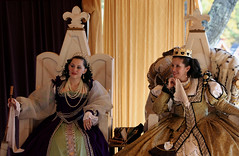 I’ve become interested recently in the topic of
I’ve become interested recently in the topic of
A good example has just come up in my Star Wars Google Wave game; while investigating the disappearance of several Adascorp freighters–in which the Hutts looked to be involved–the players accepted a job delivering a strange package to someone named Klek. They found the bar where Klek lived, were sent into a back room, and were greeted by Klek the Hutt.
How do players deal with that sort of situation? Wouldn’t it be cool if a
Note: Yes, this could be treated like a skill challenge in D&D 4E, but skill challenges have simple binary outcomes. You succeed or you fail. Social interaction is never that simple.
In pursuit of this, I bought a copy of Blue Rose, “the
So I spent some time last week hashing out some variables for a
Character Attributes
Each
- Honor
- Beauty
- Psychic/Magical Ability
- Charisma
- Craftiness
- Physical Endurance
To determine your character’s stats in these, roll a d100 (or a percentile die and a d10) for each of the above attributes. If all six rolls total 500 or more,
Note: I’d like to add charts for each of these characteristics, indicating the overall distribution of these numbers across the population. Someone in the lowest 5% of psychic ability, for example, is
In addition, each character rolls a d100 for each of three types of resources:
- Knowledge
- Money
- Influence
That influence score can then be divided amongst the various organizations over which the character has influence, depending on the setting. For example, in a Medieval European setting where one plays a noble, one may have influence over one’s serfs, the clergy, and the crown.
Each character also has at least one character goal. These are all
Moreover, each character maps his or her relationships with the other notable characters and groups in the game, on a scale of -4 (worst enemy) to +4 (best friends/intimate lovers), and an emotional bank from 0 to 5, indicating how much energy they’re willing to devote to social interactions. I’m not sure whether the emotional bank should be one overall score, or individualized to specific people and groups.
 Playing a Social Conflict
Playing a Social Conflict
When a social conflict begins, each side in the conflict determines their conflict goals, such as “Increase the Queen’s relationship with me to +1” or “Find out what Don Ferrigno knows about the death of Jericho Fats.”
Character goals are kept hidden (unless they’re generally known), but may be revealed during the conflict.
There are no die rolls during a social conflict. Each character asks for help, offers information or resources, etc., which may or may not be accepted by the other characters.
Doing a small favor for someone may increase that character’s emotional bank by 1; a big favor by 3. Once the emotional bank hits 5, the relationship score increases by one rank and the emotional bank resets to 1. If the emotional bank drops below 0, the relationship score decreases by one rank.
As characters interact with the world, their resources change. Their characteristics can also be affected, of course.
Were I to include a combat mechanic, I’d use something like Fudge: each weapon provides a small bonus (+1 to +3), as does significant armor. Roll Fudge dice (which provide -4 to +4), add the result to any weapon bonuses, and compare to the opponent’s armor value. If you meet or beat the armor rating, you hit. There are enough damage systems in the world that I leave that to the reader’s imagination.
What do you think?
It's an interesting concept. I'd like to see it tired out though in oder to determine practicality.